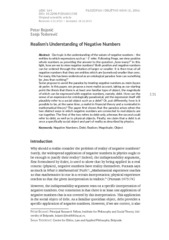Realism’s Understanding of Negative Numbers
Апстракт
Our topic is the understanding of the nature of negative numbers – the entities to which expressions such as ‘-1’ refer. Following Frege, we view positive whole numbers as providing the answer to the question „how many?“ In this light, how are we to view negative numbers? Both positive and negative numbers can be ordered through the relation of larger or smaller. It is then true of all negative numbers that they are entities which are (somehow) smaller than zero. For many, this has been understood as an ontological paradox: how can something be „less than nothing?“ Some propose to avoid the paradox by treating negative numbers as mere façons de parler. In this paper, we propose a more realist account, taking as our starting point the thesis that there is at least one familiar type of object, the magnitude of which can be expressed with negative numbers, namely, debt. How can the sense of an expression be ontologically paradoxical, yet the expression itself still plausibly refer to a so...cial object such as a debt? Or, put differently, how is it possible to be, at the same time, a realist in financial theory and a nominalist in mathematical theory? The paper first shows that the paradox arises when the two distinct ways in which negative numbers are connected to real objects are run together. The first of the two refers to debt only, whereas the second could refer to debt, as well as to physical objects. Finally, we claim that a debt is at once a specifically social object and part of reality as described by physics.
Кључне речи:
negative numbers / debt / realismИзвор:
Filozofija i društvo/Philosophy and Society, 2016, 131-136Издавач:
- Beograd : Institut za filozofiju i društvenu teoriju
Институција/група
IFDTTY - JOUR AU - Bojanić, Petar D. AU - Todorović, Sanja PY - 2016 UR - http://rifdt.instifdt.bg.ac.rs/123456789/345 AB - Our topic is the understanding of the nature of negative numbers – the entities to which expressions such as ‘-1’ refer. Following Frege, we view positive whole numbers as providing the answer to the question „how many?“ In this light, how are we to view negative numbers? Both positive and negative numbers can be ordered through the relation of larger or smaller. It is then true of all negative numbers that they are entities which are (somehow) smaller than zero. For many, this has been understood as an ontological paradox: how can something be „less than nothing?“ Some propose to avoid the paradox by treating negative numbers as mere façons de parler. In this paper, we propose a more realist account, taking as our starting point the thesis that there is at least one familiar type of object, the magnitude of which can be expressed with negative numbers, namely, debt. How can the sense of an expression be ontologically paradoxical, yet the expression itself still plausibly refer to a social object such as a debt? Or, put differently, how is it possible to be, at the same time, a realist in financial theory and a nominalist in mathematical theory? The paper first shows that the paradox arises when the two distinct ways in which negative numbers are connected to real objects are run together. The first of the two refers to debt only, whereas the second could refer to debt, as well as to physical objects. Finally, we claim that a debt is at once a specifically social object and part of reality as described by physics. PB - Beograd : Institut za filozofiju i društvenu teoriju T2 - Filozofija i društvo/Philosophy and Society T1 - Realism’s Understanding of Negative Numbers SP - 131 EP - 136 DO - 10.2298/FID1601131B ER -
@article{
author = "Bojanić, Petar D. and Todorović, Sanja",
year = "2016",
abstract = "Our topic is the understanding of the nature of negative numbers – the entities to which expressions such as ‘-1’ refer. Following Frege, we view positive whole numbers as providing the answer to the question „how many?“ In this light, how are we to view negative numbers? Both positive and negative numbers can be ordered through the relation of larger or smaller. It is then true of all negative numbers that they are entities which are (somehow) smaller than zero. For many, this has been understood as an ontological paradox: how can something be „less than nothing?“ Some propose to avoid the paradox by treating negative numbers as mere façons de parler. In this paper, we propose a more realist account, taking as our starting point the thesis that there is at least one familiar type of object, the magnitude of which can be expressed with negative numbers, namely, debt. How can the sense of an expression be ontologically paradoxical, yet the expression itself still plausibly refer to a social object such as a debt? Or, put differently, how is it possible to be, at the same time, a realist in financial theory and a nominalist in mathematical theory? The paper first shows that the paradox arises when the two distinct ways in which negative numbers are connected to real objects are run together. The first of the two refers to debt only, whereas the second could refer to debt, as well as to physical objects. Finally, we claim that a debt is at once a specifically social object and part of reality as described by physics.",
publisher = "Beograd : Institut za filozofiju i društvenu teoriju",
journal = "Filozofija i društvo/Philosophy and Society",
title = "Realism’s Understanding of Negative Numbers",
pages = "131-136",
doi = "10.2298/FID1601131B"
}
Bojanić, P. D.,& Todorović, S.. (2016). Realism’s Understanding of Negative Numbers. in Filozofija i društvo/Philosophy and Society Beograd : Institut za filozofiju i društvenu teoriju., 131-136. https://doi.org/10.2298/FID1601131B
Bojanić PD, Todorović S. Realism’s Understanding of Negative Numbers. in Filozofija i društvo/Philosophy and Society. 2016;:131-136. doi:10.2298/FID1601131B .
Bojanić, Petar D., Todorović, Sanja, "Realism’s Understanding of Negative Numbers" in Filozofija i društvo/Philosophy and Society (2016):131-136, https://doi.org/10.2298/FID1601131B . .



